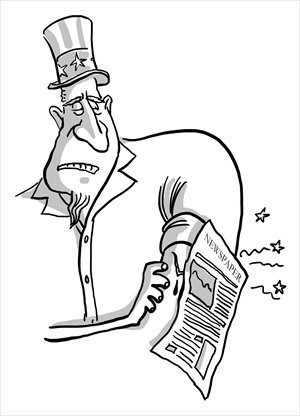Media's lingering on Boston bombings rubs salt into wound

It's been about three weeks since the Boston bombings. But the news is still coming in, scattered here and there.
It's hard for me to imagine what could still be new after the funerals of the dead, surgery for the injured, the recounting of events by the witnesses, the capture of the surviving suspect, the denials of his parents, and the darts thrown at the FBI for missing the warning from Russia.
But based on my own professional experience, we reporters can always dig up something out of nothing if we are persistent and try hard enough.
And judging by the resources the domestic and international media have put into covering this horror, you may have to see the same pictures of the bloody bombing scene and the faces of the two terrorist brothers again and again and again, at least for a while. And then at the end of the year there will be the big look back at the Boston bombings as one of the news events of the year.
The Boston bombings tested the media on many fronts. Should the brutal images of a shredded leg, a detached foot or blood gushing be cropped out from pictures in newspapers and on websites? When suspects are still at large, how detailed can our descriptions be of police activities without becoming informants for the suspects?
These kinds of questions have already been thoroughly thought through by fellow journalists and discussed openly in the media. But few people in the media at least seem to have questioned the endless coverage of the tragedy.
That may be a question of reasonable neglect. Why should we blame ourselves for being hardworking?
Indeed, the journalists on the frontline really deserve a thumbs-up for their diligence. The anchors who stayed on air for seven hours, the reporters who stood in the cold wind for 10 or more hours, the editors who volunteered to come back to work on their days off, and those who are still stationed in Boston and searching for anything that could have been missed or could still be happening, are all a flash back to newsrooms in the weeks straight after the September 11 attacks.
But should the media have the same obsessive focus in covering the Boston bombings as in covering the September 11 attacks?
Yes, they are both deadly terrorist attacks on the homeland and shocked the world. But one caused almost 3,000 deaths and the other only three.
Every life is valuable, and the loss of an innocent one to terrorism is tragedy. But are the media confusing the public about the scale of the attacks by giving them the same amount of attention? Should we apply some logical sense, some news judgment, and give the Boston story just a little less spotlight? After all, it is not so crazy to see the weeks of coverage as a win for the bombers.
And, yes, journalism is not very scientific, and the media will zone in on just about anything substantial in a quiet news cycle. But the Boston bombings didn't happen in such times. Two days later, a fertilizer plant in West, Texas exploded and killed dozens of people and injured more than 180. And the resource-stretched media gave it only modest attention.
Maybe the disparity comes from our assumption that people would be more interested in learning the details of a terrorist attack than an industrial accident because the former can happen to anyone and the latter may not.
Nevertheless, that is like saying a plane is more likely to crash than a car, an assertion that would have to be challenged. But the question eventually has to come back to the public.
New York Times columnist Thomas Friedman, a day after the Boston bombings, offered his advice to thwart terrorists: "Let's repair the sidewalk immediately, fix the windows, fill the holes and leave no trace - no shrines, no flowers, no statues, no plagues - and return life to normal there as fast as possible."
I remember reading the piece and thinking how anyone could take such advice when the dead are yet to be buried and the wounds are still open. But now, I wonder why we've been putting off Friedman's suggestion for so long.
Does our endless coverage of the tragedy augment the sadness and fear of the public and preventing life from moving on? And where should the line between selling newspapers and serving the public be?
The author is a New York-based journalist. rong_xiaoqing@hotmail.com